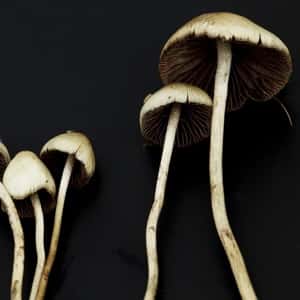
People with life-threatening cancer often feel anxious or depressed. Understandably, many have severe death anxiety. It is not always amenable to standard psychotherapeutic treatment. For some time now, scientists have been testing the hallucinogen psilocybin to ease this distress.
A Unique Approach to Easing Cancer Death Anxiety:
Pilot studies conducted at Johns Hopkins University and New York University Langone Medical Center demonstrate that psilocybin, the psychoactive compound in hallucinogenic mushrooms, provides significant relief from debilitating emotional distress. In both of these double-blind studies, patients receiving psilocybin reported less depression and death anxiety and more optimism, quality of life and life satisfaction.
The Johns Hopkins study included 51 individuals, while the New York University study had 29 volunteers. In the NYU study, patients received psilocybin in one session and placebo (niacin) in another session seven weeks later. For the Johns Hopkins study, the two sessions included a low dose and a high dose of psilocybin. In both studies, neither the patients nor the experimenters knew which medication was given first to which patients. This is called a cross-over design (Journal of Psychopharmacology, Dec. 2016).
What Did the Scientists Measure?
The participants were assessed for mood, attitudes and behaviors as soon as they enrolled in the study, five weeks after each session, and six months after the second session. In addition, a “community observer” (family member or friend) was interviewed regarding each volunteer.
The scientists report that psilocybin reduced depression significantly. The effect lasted through to the final assessment. At six months, 78 percent of the participants had much less depression and 83 percent had significantly lower anxiety. About two-thirds of the volunteers rated the single dose of psilocybin as one of the most meaningful experiences in their lives. Those who reported a profound mystical experience were most likely to have a significant, lasting benefit. The authors of both studies think that psilocybin should be further investigated as a way to help cancer patients manage their death anxiety.
Dissenters Speak Up:
Not all other experts agree. One physician, William Breitbart, MD, of Memorial Sloan Kettering, told The New York Times that he worries psilocybin might follow the route of medical marijuana. In that case, the drug was initially reserved for cancer patients but was then used more widely.
Psilocybin can cause adverse effects, including elevated blood pressure, nausea and vomiting and even anxiety during the session itself. These studies were both carefully designed to maximize the therapeutic effect of the intervention, with monitors, music and a supportive environment. No one is suggesting that cancer patients should tackle this as a do-it-yourself project. Both research teams believe that their positive results warrant further exploration.
Follow-Up Research Supports Psilocybin for Cancer Patients’ Depression:
Seven years after this original research, investigators published an additional study. The volunteers in this trial were cancer patients with profound depression. This understandable reaction to a cancer diagnosis can have a negative impact on treatment and quality of life.
Scientists tested the effectiveness of a single dose of psilocybin together with individual counseling and group support (Cancer, Dec. 18, 2023). Thirty cancer patients volunteered for this study. Following treatment, their depression severity dropped dramatically.
No patients experienced serious side effects, and four-fifths had a sustained response for at least two months following one psilocybin treatment. This shows that it is feasible to deliver the treatment in small groups in community cancer centers. Patients were overall positive about the experience.
Citations
- Griffiths RR et al, "Psilocybin produces substantial and sustained decreases in depression and anxiety in patients with life-threatening cancer: A randomized double-blind trial." Journal of Psychopharmacology, Dec. 2016. DOI: 10.1177/0269881116675513
- Agrawal M et al, "Psilocybin-assisted group therapy in patients with cancer diagnosed with a major depressive disorder." Cancer, Dec. 18, 2023. DOI: 10.1002/cncr.35010

